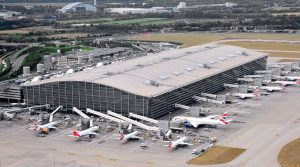Reeds Weybridge 28 Sutton & Epsom RFC 33. Saturday 22nd March.
The denouement of the campaign is rather lacking in a crescendo this season. This was the penultimate Saturday and it will be followed by yet another tedious blank Saturday. No doubt the boffins would argue that clubs need a rest before the frantic finale.
When these two teams met in December the nation was mopping up after Storm Darragh and everyone was grateful to avoid a postponement. A trio of Sutton tries edged out the visitors in a keenly contested match that ended 17-11. With Sutton lying fifth in the table and Reeds only a place below, expectations were for another even encounter. The crowd was not disappointed as Sutton & Epsom edged a game of fluctuating fortunes by 33-28.
Despite an ominous roll of thunder whilst the teams warmed up, the match was played on a dry afternoon on a very firm surface. The Whiteley Village location has arguably the most significantly advantageous slope in the league. Sutton kicked off with the advantage not only of topography but also the breeze.
The visitors started well, dominating possession in the opposition 22, running through their patterns. After a couple of penalties the pressure told as prop Callum Gibson forced his way over in the third minute for the opening try. Freddy Bunting converted for a 7-0 lead.
Reeds immediately illustrated the attacking potential of their illustrious back division as they ran back a kick and won a penalty. The chance to get on the scoreboard after winning the line out was squandered by a poor pass as the low ball was kicked through and a grateful S&E touched down for a drop out.
Five minutes later that attacking threat bore fruit with a sumptuous score from 40 metres out. Matt Stevenson was put into space by an initial break and finished with élan as he left defenders floundering in his wake. Joshua Clark converted to level the scores at 7-7.
The Black & Whites returned to attack mode aided by a penalty kicked into the corner. Yet again the hosts demonstrated not only superb defensive organisation but also cussed tenacity as Sutton launched wave after wave of attacks. Dan Jones was halted by a high tackle near the line. The result was a penalty and hooker Rhys Day getting ten minutes off for bad behaviour. From the penalty Sutton forced their way over and their leading tryscorer Dan Jones got his rewards. Freddy Bunting added the easy extras to restore the lead with a 14-7 advantage near the end of the first quarter.
Everything was in Sutton’s favour — the slope, the breeze, and now the numerical advantage. However, they failed to convert pressure and a spirited Reeds continued to look to unleash their backs at every opportunity. The quality of the visitors’ play also deteriorated. They were held up over the line, they opted to kick to the corner and kicked it dead and were frustrated.
After the half-hour mark Matt Whitaker replaced Ben Tame as the back row reorganised to accommodate the talismanic Number 8. The malaise spread to the decision-making. A fatal failure of risk assessment saw a clearance from the 22 declined in favour of running the ball. Optimist tackled, penalty gifted and try conceded. The ruthless Reeds attack took the opportunity as prop Kerran Beavis muscled his way over. Despite the conversion failing the hosts only trailed 12-14.
A two-point advantage with less than ten minutes remaining in the first half was not only insignificant but also well below par for this particular location. Sutton urgency began to look like desperation as another attempt to counter from their 22 ended with poor passing. The situation deteriorated as Captain Bunting was given a yellow for a collision in the centres. Joshua Clark stepped up and knocked over the subsequent penalty for a 15-14 lead.
As the travelling support from Rugby Lane pondered how it had gone so heinously awry they were served up one final unamusing amuse bouche before the break. They were awarded a penalty in front of the posts on the 22. Declining a simple three points to retake the lead when playing with 14 they opted to kick to the corner. Their bearings were faulty as the ball was kicked dead.
The situation could have swiftly turned from trying to terminal as a Reeds counter threatened to score. Small mercies for the visitors as Mr Lipetz-Robic blew his whistle to end the half with Reeds Weybridge 15-14 up.
At the break the hosts held the advantage not only on the scoreboard but also on the pitch with favourable conditions, a man advantage and a back division that was on song. It was going to be an uphill struggle for Sutton & Epsom in every sense of the phrase. Their defence would have to be at its best and they would have to find a tactical approach to maximise their strengths whilst mitigating the slope.
Thomas Boaden replaced Dan Johnson in the visitors’ front row but the hosts turned the screw at the start of the second half. A flurry of penalties was followed by a warning to the Black & Whites as they were forced back in their 22. With a sense of inevitability a penalty was kicked to the corner and the Whiteley Village pack exploited the lineout to usher over lock Cameron Goodwin for their third try of the afternoon. Clark’s conversion failed but Reeds led 20-14.
Sutton regained possession at the restart and won a penalty that they advanced deep into the enemy 22. This signalled the moment that veteran Matt Whitaker began to impose his considerable talent on the afternoon’s proceedings. Playing his 201st game with all the hunger of his first he scored his 118th try — a typically abrasive carry leaving tacklers hanging off his powerful frame. Freddy Bunting inched Sutton ahead by 21-20.
The Black & Whites had appreciated that the road to glory on this afternoon would be on a path trod by their pack. The trio of Whitaker, Lennie and Gibson were at the forefront of a mighty effort to negate the slope as they carried relentlessly, compiling impressive statistics for yardage gained.
However, the quality back play of the hosts would remain a constant threat. Ten minutes later the partisan crowd were raising their glasses to salute their bonus point score as Reeds regained the lead. Once more it was superb back play with the excellent Will Jones at 15 creating the opening for replacement Nick Brown to score. It was advantage Reeds as they led 25-21.
In this fluctuating fixture the crowd did not have to wait long for another twist. Within five minutes S&E had their bonus point for a fourth try and had taken back the lead. Playing with renewed vigour and belief they demonstrated impressive efficiency as the pack turned pressure into points in the 22 with Rob Hegarty being the beneficiary on this occasion. The conversion drifted wide as the Rugby Lane team led by a solitary point 26-25 as the referee informed the protagonists that they had 15 left to play.
The visitors’ chances were dealt a blow at the restart as Thomas Boaden was issued a yellow and Sutton again had to play with 14. The hosts tried desperately to make the advantage count. The Black & White line held, repelling a 5-metre lineout as they kept the ball with their tireless pack.
With five minutes remaining Reeds Weybridge were awarded a penalty. Joshua Clark stepped up and calmly bisected the uprights from 45 metres for a 28-26 lead.
As the match entered time added on the referee intervened once more to flourish a yellow card. A high tackle on Dan Jones meant that the hosts would finish the match a man down.
A minute later S&E had scored. Demonstrating superb control from a lineout, first Matt Whitaker and then Sam Lennie carried towards the line. The ball was spun wide to prop Callum Gibson who was in splendid isolation. He ran home his second try of the afternoon, concluding with a celebratory dive that was less Tom Daley and more of a belly flop. Freddy Bunting added the vital extras for 33-28, meaning Reeds required a try to draw or a goal to win.
Almost inevitably Sutton conceded a penalty at the restart to ensure high anxiety for the conclusion. Penalties followed as the ball advanced to the 22. The hosts declined the kick to the corner and tapped from a central position, no doubt searching for a try that would have a more advantageous position for the conversion.
The S&E defence stood strong until the hosts knocked on and from the scrum they dispatched the ball into the neighbouring pitch for a hard fought win.
The season concludes on Saturday April 5th as the Black & Whites head to Horn Park where Old Colfeians will no doubt be a much improved outfit to the one that lost 50-7 on the opening day of the season. Whilst Sutton were winning in Whiteley Village the Old Boys had a significant 31-17 win at Gravesend that secured their Level status.
Sutton & Epsom:
Findlay, Nelson, Bibby, Bunting ©, Scott, Lennard, Munford, Johnson, Lennie, Gibson, McTaggart, Glanville, Tame, Jones & Hegarty.
Replacements: Boaden, Whitaker & Rea.
Reeds Weybridge:
Jones, Maitland, Stevenson, Forbes, Bennett, J. Clark, Beavis, R. Day, Agyapong-Ntrah, Goodwin, Finn, Ewington, Wastie & Corner.
Replacements: Howe, McKinley & Brown.











